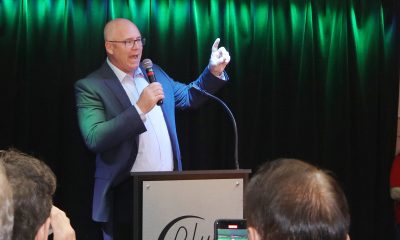Local
Rehoboth officials accused of ‘hassling’ businesses
Code enforcement officer creates stir over visit to Aqua Grill

A code enforcement officer in Rehoboth Beach, Del., became the target of a radio talk show host last weekend after the officer told the gay bar and restaurant Aqua Grill that it violated a local ordinance for flying a flag two inches too low over the sidewalk next to its entrance.
The civilian enforcement officer informed Aqua’s manager of the code violation on May 13 after determining that a flag with the inscription “Open – Welcome to Beautiful Baltimore Avenue” dipped below an 80-inch minimum height restriction for flags extending into public spaces, according to Aqua Grill co-owner Joe Maggio.
“He said we were being cited and we would receive a letter in the mail,” said Maggio, who told the Blade he couldn’t confirm over the weekend whether the bar would be fined for the height violation.
“He could have come in and said, ‘hey, it needs to be raised two inches.’ And we would have been happy to pull out a drill and move it,” said Maggio.
The popular bar and restaurant decided instead to have someone shear off the bottom of the flag with a pair of scissors to comply with the height restriction, Maggio said.
A city official said on Monday said Aqua Grill wasn’t fined and that the enforcement officer only issued a warning, saying the city would give the establishment time to correct the infraction.
But news of the enforcement action created a stir when an Aqua Grill customer present during the visit by the enforcement officer posted an account of the incident on Facebook.
Sussex County radio host Dan Gaffney joined gay supportive Delaware State Rep. Pete Schwartzkopf (D-Rehoboth Beach) and other Aqua Grill customers in criticizing the city for appearing to be hurting local businesses through unnecessary regulations.
“This is stupid beyond belief,” Schwartzkopf wrote on Facebook. “In this economy, they are hassling businesses? I thought it might’ve been the American flag but we are talking about an ‘Open’ sign!”
Rehoboth Beach City Manager Gregory Ferrese said on Monday that the code enforcement officer has found violations of the height restriction for flags in 29 businesses so far this year. He said no specific type of business was being singled out in the enforcement action and that all businesses contacted so far have been given warning notices rather than a fine.
Ferrese and the city’s public works director, Mel Craig, who is gay, told the Blade that enforcement of the height regulation for flags hanging over public spaces like sidewalks was prompted by complaints from the public.
“I’ve gotten hit in the face by flags on a windy day when I walk down the sidewalk,” Craig said.
“If a kid gets hit in the eye with a flag, that’s a big deal,” said Ferrese.
According to Ferrese, city regulatory officials determined that the city is required to enforce the flag height restriction in order to comply with the Americans with Disabilities Act, or ADA, a federal law. The law, among other things, requires cities and towns to make sure the “path of travel” along public spaces such as sidewalks doesn’t include a potential obstruction for people with disabilities, including blind people.
An ADA official with the U.S. Justice Department in Washington, which enforces the statute, said the law and the regulations implementing it make no specific mention of flags, only that local jurisdictions should ensure that sidewalks and other public spaces don’t create a hazard for disabled people.
Jacques LeClair, owner of Rehoboth’s Proud Book Store, said he was among the first businesses approached by code enforcement officer Bobby Edmonds about flying his own flag below the height restriction.
“He was very polite. I got a letter from his office saying I was in violation,” LeClair said. “They gave me a period of time to correct it. I corrected it.”
LeClair added, “It’s not that they are picking on any one person or business. They are picking on everyone.”
Chris Beagle, a Rehoboth real estate agent and Aqua Grill customer, said the flag enforcement visit at Aqua raised concern within the local LGBT community because of its timing. He noted that it came on the first day Aqua opened for business for the 2011 beach season.
Beagle noted it also came eight months after Aqua’s other owner, Bill Shields, was mistakenly arrested and finger printed for allegedly violating another ordinance that prohibits restaurants and bars from allowing customers to stay on outdoor patios after 11 p.m.
Police raided 12 establishments for the patio violation during a crackdown last year that took place mostly over Labor Day weekend. Authorities now admit that Aqua was among just two or three of the establishments that were incorrectly targeted for the crackdown.
Shields said a Rehoboth Beach police officer who arrested him refused to listen to his attempt to explain that Aqua and other establishments that were in business before the patio ordinance was enacted are exempt from the ordinance through a grandfather clause.
Rehoboth’s police chief later acknowledged that the officer made a mistake by arresting Shields, saying the officer wasn’t aware that Aqua was exempt from the ordinance. Police later dropped the charge, but Shields said authorities have yet to follow through with a promise to expunge his arrest record.
With that as a backdrop, Beagle said the code enforcement visit to Aqua over the flag issue last weekend was “really bad timing” and a development that could give the impression to the LGBT community that a gay business is being targeted.
“It was very disheartening to see this happen on opening night,” said Beagle, who was present at the bar and saw Edmonds arrive wearing a jacket with the inscription “Code Enforcement.”
Maggio said he and other business owners and longtime residents of Rehoboth, both gay and straight, are “fed up” with what they view as an anti-business attitude in a city whose economy is dependent on small businesses.
He said he and others dissatisfied over the city’s regulatory policies are supporting gay businessman Thomas McGlone, an investment adviser, who is running against longtime Rehoboth Mayor Samuel Cooper in the city’s Aug. 13 mayoral election.
Cooper disputes claims that he is anti-business. He has said he supports local laws and regulations that prevent bars and other entertainment establishments from spoiling Rehoboth’s status and tradition as a family-oriented vacation destination.
Two of the city’s six elected commissioners, Dennis Barbour, who is gay, and Pat Coluzzi, who is lesbian, say they favor a balance between regulations needed to prevent disruptive businesses and assurances that businesses aren’t hurt by overregulation.
The two have spoken out against the patio crackdown last year and called for regulatory changes.

In an official statement released at the reveal event Capital Pride Alliance described its just announced 2026 Pride theme of “Exist, Resist, Have the Audacity” as a “bold declaration affirming the presence, resilience, and courage of LGBTQ+ people around the world.”
The statement adds, “Grounded in the undeniable truth that our existence is not up for debate, this year’s theme calls on the community to live loudly and proudly, stand firm against injustice and erasure, and embody the collective strength that has always defined the LGBTQ+ community.”
In a reference to the impact of the hostile political climate, the statement says, “In a time when LGBTQ+ rights and history continue to face challenges, especially in our Nation’s Capital, where policy and public discourse shape the future of our country, together, we must ensure that our voices are visible, heard, and unapologetically centered.”
The statement also quotes Capital Pride Alliance CEO and President Ryan Bos’s message at the Reveal event: “This year’s theme is both a declaration and a demand,” Bos said. “Exist, Resist, Have Audacity! reflects the resilience of our community and our responsibility to protect the progress we’ve made. As we look toward our nation’s 250th anniversary, we affirm that LGBTQ+ people have always been and always will be part of the United States’s history, and we will continue shaping its future with strength and resolve,” he concluded.
District of Columbia
Capital Pride board member resigns, alleges failure to address ‘sexual misconduct’
In startling letter, Taylor Chandler says board’s inaction protected ‘sexual predator’

Taylor Lianne Chandler, a member of the Capital Pride Alliance Board of Directors since 2019 who most recently served as the board’s secretary, submitted a letter of resignation on Feb. 24 that alleges the board has failed to address instances of “sexual misconduct” within the Capital Pride organization.
The Washington Blade received a copy of Chandler’s resignation letter one day after she submitted it from an anonymous source. Chandler, who identifies as transgender and intersex, said in an interview that she did not send the letter to the Blade, but she suspected someone associated with Capital Pride, which organizes D.C.’s annual LGBTQ Pride events, “wants it out in the open.”
“It is with a heavy heart, but with absolute clarity, that I submit my resignation from the Capital Pride Alliance Board of Directors effective immediately,” Chandler states in her letter. “I have devoted nearly ten years of my life to this organization,” she wrote, pointing to her initial involvement as a volunteer and later as a producer of events as chair of the organization’s Transgender, Gender Non-Conforming, and Intersex Committee.
“Capital Pride once meant something profound to me – a space of safety, visibility, and community for people who have often been denied all three,” her letter continues. “That is no longer the organization I am part of today.”
“I, along with other board members, brought forward credible concerns regarding sexual misconduct – a pattern of behavior spanning years – to the attention of this board,” Chandler states in the letter. “What followed was not accountability. What followed was retaliation. Rather than addressing the substance of what was reported, officers and fellow board members chose to chastise those of us who came forward.”
The letter adds, “This board has made its priorities clear through its actions: protecting a sexual predator matters more than protecting the people who had the courage to come forward. … I have been targeted, bullied, and made to feel like an outsider for doing what any person of integrity would do – telling the truth.”
In response to a request from the Blade for comment, Anna Jinkerson, who serves as chair of the Capital Pride board, sent the Blade a statement praising Taylor Chandler’s efforts as a Capital Pride volunteer and board member but did not specifically address the issue of alleged sexual misconduct.
“We’re also aware that her resignation letter has been shared with the media and has listed concerns,” Jinkerson said in her statement. “When concerns are brought to CPA, we act quickly and appropriately to address them,” she said.
“As we continue to grow our organization, we’re proactively strengthening the policies and procedures that shape our systems, our infrastructure, and the support we provide to our team and partners,” Jinkerson said in her statement. “We’re doing this because the community’s experience with CPA must always be safe, affirming, empowering, and inclusive,” she added.
In an interview with the Blade, Chandler said she was not the target of the alleged sexual harassment.
She said a Capital Pride investigation identified one individual implicated in a “pattern” of sexual harassment related behavior over a period of time. But she said she was bound by a Non-Disclosure Agreement (NDA) that applies to all board members and she cannot disclose the name of the person implicated in alleged sexual misconduct or those who came forward to complain about it.
“It was one individual, but there was a pattern and a history,” Chandler said, noting that was the extent of what she can disclose.
“And I’ll say this,” she added. “In my opinion, with gay culture sometimes the touchy feely-ness that goes on seems to be like just part of the culture, not necessarily the same as a sexual assault or whatever. But at the same time, if someone does not want those advances and they’re saying no and trying to push you away and trying to avoid you, then it makes it that way regardless of the culture.”
When asked about when the allegations of sexual harassment first surfaced, Chandler said, “In the past year is when the allegation came forward from one individual. But in the course of this all happening, other individuals came forward and talked about instances – several which showed a pattern.”
Chandler’s resignation comes about five months after Capital Pride Alliance announced in a statement released in October 2025 that its then board president, Ashley Smith, resigned from his position on Oct. 18 after Capital Pride became aware of a “claim” regarding Smith. The statement said the group retained an independent firm to investigate the matter, but it released no further details since that time. Smith has declined to comment on the matter.
When asked by the Blade if the Smith resignation could be linked in some way to allegations of sexual misconduct, Chandler said, “I can’t make a comment one way or the other on that.”
Chandler’s resignation and allegations come after Capital Pride Alliance has been credited with playing the lead role in organizing the World Pride celebration hosted by D.C. in which dozens of LGBTQ-related Pride events were held from May through June of 2025.
The letter of resignation also came just days before Capital Pride Alliance’s annual “Reveal” event scheduled for Feb. 26 at the Hamilton Hotel in which the theme for D.C.’s June 2026 LGBTQ Pride events was to be announced along with other Pride plans.
District of Columbia
Capital Stonewall Democrats elect new leaders
LGBTQ political group set to celebrate 50th anniversary

Longtime Democratic Party activists Stevie McCarty and Brad Howard won election last week as president and vice president for administration for the Capital Stonewall Democrats, D.C.’s largest local LGBTQ political organization.
In a Feb. 24 announcement, the group said McCarty and Howard, both of whom are elected DC Advisory Neighborhood Commissioners, ran in a special Capital Stonewall Democrats election to fill the two leadership positions that became vacant when the officers they replaced resigned.
Outgoing President Howard Garrett, who McCarty has replaced, told the Washington Blade he resigned after taking on a new position as chair of the city’s Ward 1 Democratic Committee. The Capital Stonewall Democrats announcement didn’t say who Howard replaced as vice president for administration.
The group’s website shows its other officers include Elizabeth Mitchell as Vice President for Legislative and Political Affairs, and Monica Nemeth as Treasurer. The officer position of secretary is vacant, the website shows.
“As we look toward 2026, the stakes for D.C. and for LGBTQ+ communities have never been clearer,” the group’s statement announcing McCarty and Howard’s election says. “Our 50th anniversary celebration on March 20 and the launch of our D.C. LGBTQ+ Voter’s Guide mark the beginning of a major year for endorsements, organizing, and coalition building,” the statement says.
McCarty said among the organization’s major endeavors will be holding virtual endorsement forums where candidates running for D.C. mayor and the Council will appear and seek the group’s endorsement.
Founded in 1976 as the Gertrude Stein Democratic Club, the organization’s members voted in 2021 to change its name to Capital Stonewall Democrats. McCarty said the 50th anniversary celebration on March 20, in which D.C. Mayor Muriel Bowser and members of the D.C. Council are expected to attend, will be held at the PEPCO Gallery meeting center at 702 8th St., N.W.





















